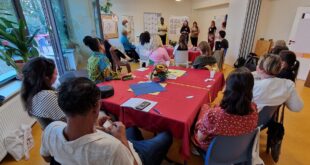Edo State gets tough on people smuggling as increasing numbers of its indigenes drown in the Mediterranean.
The government of Edo State, Nigeria, has announced its intention to make a law criminalizing human trafficking. The intention of the legislation, according to the state’s commissioner for justice, Prof. Yinka Omorogbe, is to curb the activities of persons engaged in the irregular migration business.
Edo State, which is a trafficking hub of irregular migrants to Europe, is making the law as part of its new strategies to tackle irregular migration and put to a stop to the deaths of its indigenes in the process of travelling to Europe through the Sahara desert and the Mediterranean.
The commissioner made the disclosure recently during the flag-off ceremony of a state-wide sensitisation workshop on human trafficking and irregular migration, held at Idogbo, the headquarters of Ikpoba Okha Local Government Area.
Prof. Omorogbe said at the event, “the state government is working on a law to ensure perpetrators who aid human trafficking and illegal migration are sentenced to jail without the option of fine. All hands must be on deck to support this drive in curtailing the menace, which has damaged the reputation of the state.”
READ ALSO 26 dead Nigerian women found on Spanish warship
The sensitisation campaign is being carried out by the Edo State Taskforce on Human Trafficking, a collaboration of the state government and international agencies such as the European Union. It is aimed at rebranding the state as an investment destination with human resources potential.
Prof. Omorogbe said instead of youths taking to irregular migration, they should rather take advantage of the state government’s initiative on job creation, as the state is already setting up technical centres for skills acquisition.
The Governor of Edo State, Mr Godwin Obaseki, recently expressed his worries over the increasing number of deaths recorded during attempts by indigenes of the state to travel to Italy illegally. He also lamented the damage that the activities of Bini prostitutes in Europe are doing to the image of the state, which is hampering foreign investment into Edo.
Governor Obaseki, at a workshop held in August at which representatives of the EU and Italian government were present, described human trafficking as a modern day slavery that is worst than kidnapping.
His words: “My government takes the issue of human trafficking very serious. For us it is a major crime, it is the modern day slavery. This is threatening the survival of our people.
“We got a data recently that about 37,000 illegal immigrants were arrested in Europe and about 15,000 of them are from Edo and Delta states. Those are even the people who survived the journey because people go through the sea, some go through the Sahara and so many must have died in the process.
“So I think it is an issue we can no longer trivialize. This is an issue that has to do with the survival of our people; it is an issue we must deal with urgently. The greatest challenge is to deal with the godfathers of trafficking and this is where we need the help of the international community and security agents to help us. These are business people, they have bank accounts in Europe, they have agents who come here to recruit people, we should be able to establish who these people are and prosecute them.”
Edo indigenes, particularly the women started migrating to Italy in the early 1990s for greener pastures and the majority were engaged in prostitution. It became a thriving business for them and they started having cartels all over Europe. Parents then got involved by selling their property to ensure their daughters were trafficked abroad while the sponsors took these victims to native doctors where they swore oath of allegiance before they moved to Italy.
Successive Edo governments, starting with the administration of Governor Lucky Igbinendion (1999-2007), adopted policies to discourage the illicit business but such efforts have had little success. This is why the current administration has decided to take the battle seriously by enacting a tough law against human trafficking in the state.
Austin Ohaegbu
 THE AFRICAN COURIER. Reporting Africa and its Diaspora! The African Courier is an international magazine published in Germany to report on Africa and the Diaspora African experience. The first issue of the bimonthly magazine appeared on the newsstands on 15 February 1998. The African Courier is a communication forum for European-African political, economic and cultural exchanges, and a voice for Africa in Europe.
THE AFRICAN COURIER. Reporting Africa and its Diaspora! The African Courier is an international magazine published in Germany to report on Africa and the Diaspora African experience. The first issue of the bimonthly magazine appeared on the newsstands on 15 February 1998. The African Courier is a communication forum for European-African political, economic and cultural exchanges, and a voice for Africa in Europe.




























